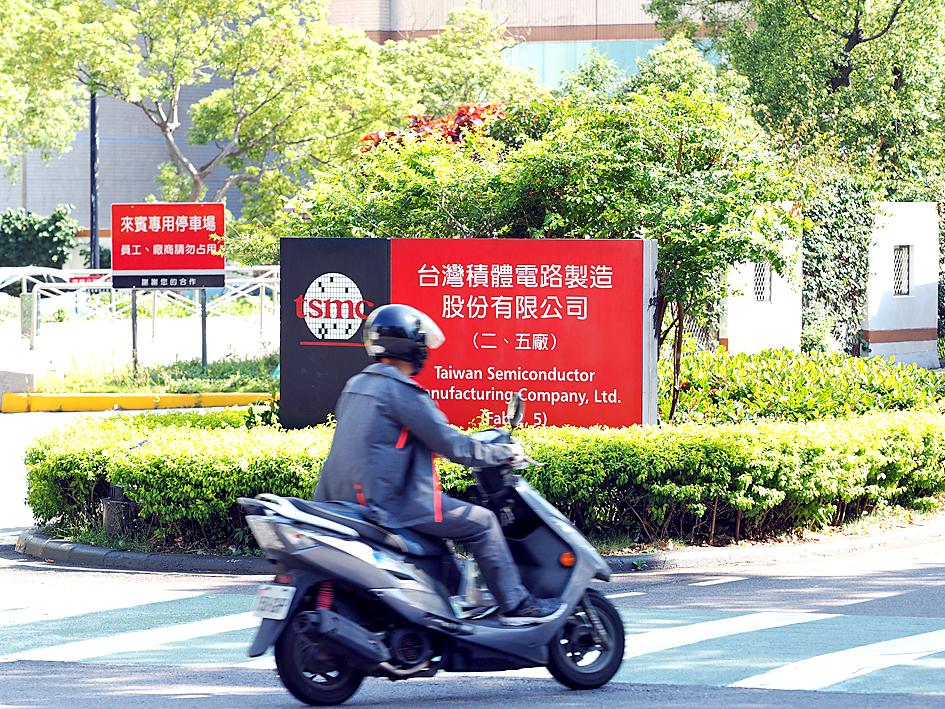Taiwan Semiconductor Manufacturing Co’s (TSMC, 台積電) plan to build an advanced wafer foundry in Arizona would not undercut its technological edge in Taiwan, economists said.
“When the planned Arizona plant using the 5 nanometer process starts production in 2024, TSMC will have advanced to the 2 nanometer process [in Taiwan],” Taiwan Institute of Economic Research (TIER, 台灣經濟研究院) research fellow Arisa Liu (劉佩真) said.
“Even if the US has the plant run by TSMC, Taiwan is expected to remain competitive as the Taiwanese semiconductor sector will own advanced technologies,” Liu said.

Photo: David Chang, EPA-EFE
On Friday, TSMC announced plans to invest US$12 billion to build the 5 nanometer fab, saying that construction is scheduled to start next year.
The 5 nanometer process is currently the world’s most advanced mass production process, but the company is developing a more sophisticated 3 nanometer process that could start mass production in 2022.
Liu said that TSMC’s 5 nanometer plant in Taiwan is expected to produce 80,000 wafers a month by the end of this year, four times the capacity of the planned US facility, and that is likely to grow next year.
At the same time, the investment in Arizona falls short of TSMC’s annual capital expenditure of between US$15 billion and US$16 billion, Liu added.
“So whether you look at [capital expenditure] or output,” TSMC and, by extension, Taiwan’s semiconductor industry, should maintain its lead, Liu said.
Stephen Su (蘇孟宗), head of the government-sponsored Industrial Technology Research Institute’s (工研院) Industrial Economics and Knowledge Center, said that TSMC chose Arizona as it is home to several semiconductor plants, including Intel Corp and NXP Semiconductors NV.
This would provide TSMC an existing supply chain to work with, Su said.
The state also has the advantages of dry weather and few natural disasters, such as earthquakes, Su said, adding that the higher labor costs in the US are not expected to be a problem because foundries are highly automated through cloud-based technologies.
Liu said that the proposed investment was likely a necessary move, because US-based businesses account for about 60 percent of its sales, and rising trade tensions between the US and China could force producers to move some production to the US.
Separately, Chinese state-backed funds pumped US$2.25 billion into a Semiconductor Manufacturing International Corp (SMIC, 中芯國際) wafer plant to support advanced chip manufacturing, as Washington tightens technology restrictions on China.
The SMIC plant’s registered capital jumped from US$3.5 billion to US$6.5 billion after the investment, the company said in an announcement on Friday.
The chipmaker’s stake in the Shanghai facility would fall from 50.1 percent to 38.5 percent, it said.
The plant has capacity to produce 6,000 14 nanometer wafers a month and plans to increase that to 35,000.
The investment came as Washington moved to prevent sales to Huawei Technologies Co (華為) from chipmakers using US technology.
The US Department of Commerce on Friday said it would require licenses before allowing US technology to be used by the Chinese company or its 114 subsidiaries, including its chip-design unit HiSilicon Technologies Co (海思半導體).
SMIC is planning a Shanghai share sale that could raise more than US$3 billion, based on its closing value of more than US$13 billion on Friday.
China is betting the local chipmaker could reduce the country’s reliance on US technology.

In Italy’s storied gold-making hubs, jewelers are reworking their designs to trim gold content as they race to blunt the effect of record prices and appeal to shoppers watching their budgets. Gold prices hit a record high on Thursday, surging near US$5,600 an ounce, more than double a year ago as geopolitical concerns and jitters over trade pushed investors toward the safe-haven asset. The rally is putting undue pressure on small artisans as they face mounting demands from customers, including international brands, to produce cheaper items, from signature pieces to wedding rings, according to interviews with four independent jewelers in Italy’s main

Japanese Prime Minister Sanae Takaichi has talked up the benefits of a weaker yen in a campaign speech, adopting a tone at odds with her finance ministry, which has refused to rule out any options to counter excessive foreign exchange volatility. Takaichi later softened her stance, saying she did not have a preference for the yen’s direction. “People say the weak yen is bad right now, but for export industries, it’s a major opportunity,” Takaichi said on Saturday at a rally for Liberal Democratic Party candidate Daishiro Yamagiwa in Kanagawa Prefecture ahead of a snap election on Sunday. “Whether it’s selling food or

CONCERNS: Tech companies investing in AI businesses that purchase their products have raised questions among investors that they are artificially propping up demand Nvidia Corp chief executive officer Jensen Huang (黃仁勳) on Saturday said that the company would be participating in OpenAI’s latest funding round, describing it as potentially “the largest investment we’ve ever made.” “We will invest a great deal of money,” Huang told reporters while visiting Taipei. “I believe in OpenAI. The work that they do is incredible. They’re one of the most consequential companies of our time.” Huang did not say exactly how much Nvidia might contribute, but described the investment as “huge.” “Let Sam announce how much he’s going to raise — it’s for him to decide,” Huang said, referring to OpenAI

The global server market is expected to grow 12.8 percent annually this year, with artificial intelligence (AI) servers projected to account for 16.5 percent, driven by continued investment in AI infrastructure by major cloud service providers (CSPs), market researcher TrendForce Corp (集邦科技) said yesterday. Global AI server shipments this year are expected to increase 28 percent year-on-year to more than 2.7 million units, driven by sustained demand from CSPs and government sovereign cloud projects, TrendForce analyst Frank Kung (龔明德) told the Taipei Times. Demand for GPU-based AI servers, including Nvidia Corp’s GB and Vera Rubin rack systems, is expected to remain high,